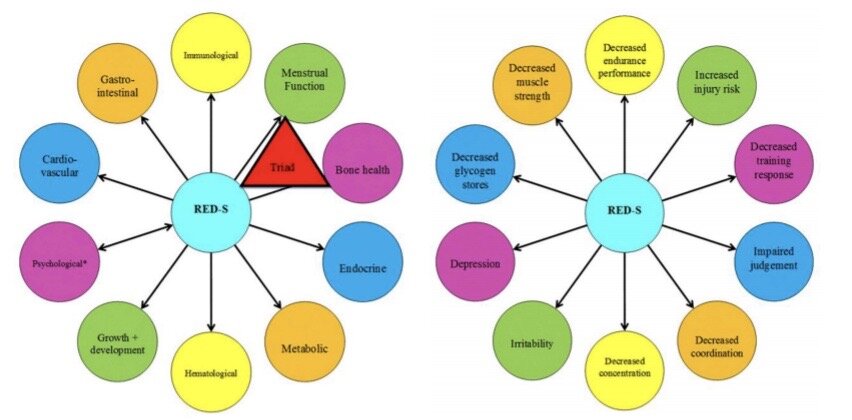Foundation of Sports Nutrition-Eating ENOUGH
As I outlined in discussing the sports nutrition Hierarchy, the foundation of a successful sports nutrition routine is first and foremost eating enough. Athletes and active individuals are notorious for chronically underfueling due to decreased hunger cues, inability to balance nutrition with activity, or as a result of diet culture in the fitness world. If you are not first making sure that you are taking in enough energy, the types of food, timing, or supplements you take won’t make a difference.
So why is it so important to make sure we are eating enough? Underfueling in athletes can lead to a condition called RED-S (Relative Energy Deficiency in Sport). The condition occurs when the energy you are taking in is less than the energy you are putting out. In other words, insufficient energy intake and/or excessive energy expenditure. This occurs when we are at a place of energy imbalance. Think about it like the scale shown below, ideally we would have our energy intake (calories) balanced with our energy output (resting calories, normal daily activities, and exercise). If energy expenditure outweighs the energy we consume, we are in an energy deficit.
Energy Deficiency in Sport
So, why is this so dangerous for athletes and active individuals? Energy Deficiency is a systemic issue, affecting athletes both physically and mentally. As we can see in these diagrams, RED-S has an affect on all body systems including the endocrine system, immunological, gastrointestinal, and cardiovascular. These things impact our bone health, growth and development, and menstrual function. Being in a state of energy deficiency has also been shown to put athletes at higher risk of depression and injury and can impact one’s coordination, reaction time, recovery, and overall performance.
Signs of Underfueling
Signs you might not be eating enough include:
Irritability
Poor recovery
Increased soreness
Injury
Intense cravings or focus on food
Hunger pangs
Headaches
Dizziness
Fatigue
So, how can you make sure to be eating enough? A good place to start is making sure you are having consistent meals and snacks during the day. A good rule of thumb to start out with is 3-4 meals containing a carb, fat, protein, and fun food along with 3-4 snacks containing 2 food groups and a fun food. Working with a Registered Dietitian can help you better recognize if you are underfueling, help you plan meals into your day, and build intuition to recognize what you need without relying on calorie or macro tracking.


